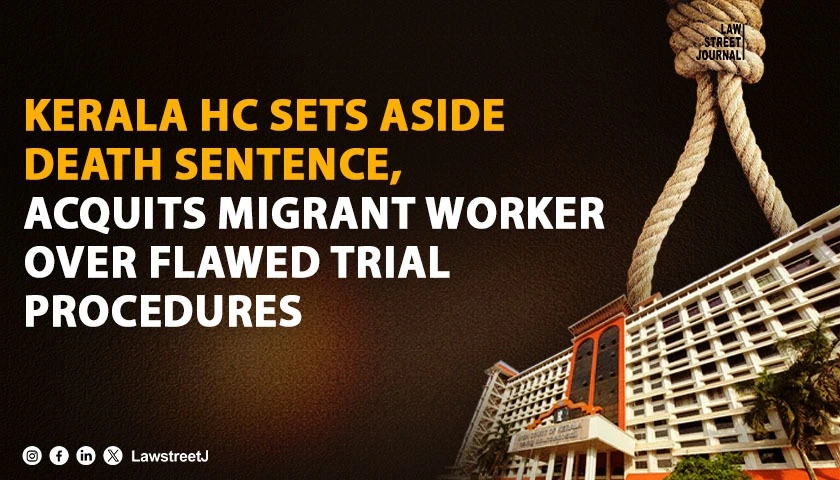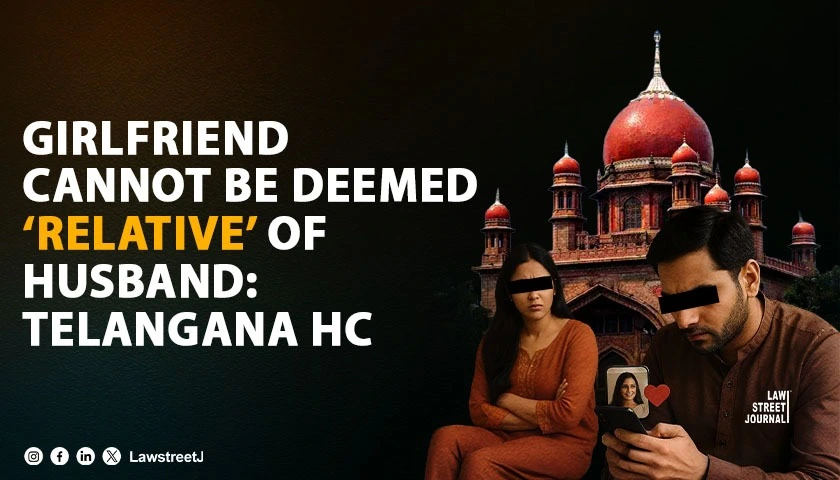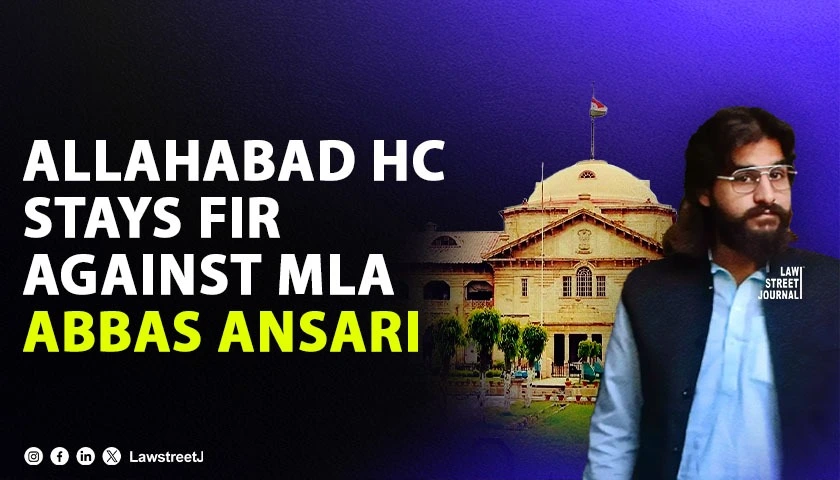Kerala: The Kerala High Court has overturned a death sentence and acquitted a migrant laborer accused of rape and murder, holding that the trial court committed serious procedural errors by failing to conduct a competency examination before recording testimony from an intellectually disabled witness who was the sole eyewitness to the alleged crime.
The Division Bench of Justice A.K. Jayasankaran Nambiar and Justice Jobin Sebastian delivered this judgment while allowing Criminal Appeal No. 974 of 2022 and answering Death Sentence Reference No. 1 of 2021 in the negative on October 31, 2025.
The Court examined the case of Parimal Sahu, a 29-year-old migrant worker from Assam, who was convicted by the Additional Sessions Judge, North Paravur, for offences under Sections 449, 376A, 302, and 201 of the IPC. The trial court had sentenced him to death under Section 376A IPC, along with life imprisonment for murder under Section 302 IPC.
The prosecution alleged that on the intervening night of March 18-19, 2018, the accused entered the house of a 60-year-old widow living with her intellectually disabled son in Puthanvelikkara. He allegedly attacked her with a granite stone, raped her, and murdered her by suffocation and strangulation.
Justice Jobin Sebastian, writing for the bench, identified critical flaws in the investigation and trial. The most significant issue centered on testimony from the deceased’s son (PW4), the prosecution’s primary witness. Medical evidence showed that PW4, though biologically 35 years old, had an IQ of only 47 and a mental age of seven-and-a-half years.
The Court emphasized the importance of conducting a voir dire examination before recording testimony from vulnerable witnesses. Justice Sebastian explained that the term voir dire translates as “oath to tell the truth” and is used to determine whether a witness is competent to testify in court.
Referring to Section 118 of the Indian Evidence Act, the Court noted that while all persons are presumed competent to testify, the trial judge must assess whether a witness can understand questions and give rational answers. The judgment stated, “Before recording the evidence of such a vulnerable witness, it is the duty of the trial judge to assess the competence of such a witness.”
Despite the obvious need for such an examination, the trial judge failed to conduct any competency test. Justice Sebastian observed, “No preliminary questions were put to him by the trial court, and his deposition was recorded without any recorded satisfaction as to his competence to testify.”
The Bench noted a troubling aspect: a voir dire test was conducted by the JFMC who recorded PW4’s statement under Section 164 CrPC, which should have alerted the trial judge about the need to conduct such a test before recording testimony in court.
Examining PW4’s testimony, the Court found serious inconsistencies. During cross-examination, PW4 gave contradictory and unintelligible responses. When asked who told him to say the accused hit with a stone, he replied “it was Munna who said it”—a completely illogical answer since Munna was the accused himself.
The Court highlighted several problematic statements, including PW4’s claim that the accused applied ice to stop bleeding (not alleged by prosecution), that the Magistrate did not write down what he said, and, when asked why he did not inform neighbours immediately, he simply said he “forgot.”
“Such incoherent and incorrect responses persuade us to conclude that the competence of the said witness is seriously in doubt. Moreover, the fact that PW4, who appeared to withstand chief-examination without much incoherence, gave incoherent and unintelligible answers during cross-examination strongly suggests that he was a tutored witness,” the Court observed.
The Court additionally held that the failure to conduct a voir dire examination created serious doubts about PW4’s competence and reliability, particularly when vulnerable witnesses are inherently susceptible to tutoring.
Beyond testimony issues, the Court examined other prosecution evidence. The prosecution relied heavily on alleged extrajudicial confessions made by the accused to two doctors during medical examinations after arrest. However, the Court rejected this evidence under Section 26 of the Indian Evidence Act, holding that confessions made while in police custody are inadmissible.
Regarding recovery of the alleged murder weapon—a granite stone—the Court found serious problems. Police officers had already been at the premises before recovery, the inquest was conducted the previous day, and local residents had gathered at the scene. Significantly, the investigating officer never stated the stone was in a concealed position when pointed out.
“The prior presence of the police, as well as local people at the crime scene, is well-established and raises concerns about potential manipulations. Therefore, it cannot be conclusively stated that the recovery was based solely on the strength of the disclosure statement,” the Court observed.
The prosecution also relied on alleged bite marks on the accused’s body. However, the Court found this evidence unreliable. Notably, the doctor who examined the accused never stated the injuries were bite marks. The Court also questioned why the investigating officer first produced the accused before a dentist rather than a registered medical practitioner as required.
The Court noted that modern forensic science has cast doubt on bite-mark analysis, stating, “Bite-mark comparison is not an exact science. The reliability of such forensic analysis has been seriously questioned in recent times, as the rate of false positives in bite-mark comparison is demonstrably high.”
Regarding dental casts allegedly prepared for comparison, the Court found a broken chain of custody. No document showed formal handover from the doctor to the investigating officer, and significantly, the dental casts were not shown to the comparison expert (PW22) during court examination, creating doubt about whether the exhibited casts were the same ones used for comparison.
The Court also examined fingerprint evidence showing one fingerprint of the accused on a 7-Up bottle in the deceased’s house. However, since the accused was a tenant in a building within the same compound, the Court held this was not significant, noting he could have consumed the beverage during casual visits.
The Bench found DNA and forensic evidence unhelpful to prosecution. While human semen and spermatozoa were detected in vaginal swabs, the FSL report stated seminal stains were “insufficient for DNA typing.” Neither the accused’s DNA nor epithelial cells were detected in the deceased’s nail clippings.
Curiously, the shirt allegedly worn by the accused (MO1) was never forwarded for chemical examination. The pants allegedly recovered after being washed by the accused yielded no DNA. No serological examination was conducted to detect blood stains on the pants.
“The evidence of PW4, upon which the prosecution heavily relies to prove the occurrence of the incident, has to be excluded from consideration since PW4 is found to be incompetent to testify. Furthermore, the prosecution’s reliance on the alleged extrajudicial confession is also misplaced as it is rendered inadmissible,” the Court observed.
In concluding observations, the Court stated, “The other circumstances projected by the prosecution have also not been proved in a manner that excludes every reasonable hypothesis except that of the guilt of the accused. The scientific evidence does not render any assistance to the prosecution; rather, it tends to help the accused in establishing his innocence.”
The Court allowed the criminal appeal, set aside the conviction and death sentence, and ordered immediate release of the appellant unless required in any other case. The death sentence reference was answered in the negative.
Case Title: Parimal Sahu vs. State of Kerala




![Kerala HC Quashes 498A Dowry Harassment Case Against Live-In Partner, Citing Lack of Relative Status [Read Order]](/secure/uploads/2023/08/lj_5693_1057c042-1e57-4e27-8c9e-25af0ec38ec4.jpg)
![Watching porn on mobile: Kerala HC highlights importance of mother cooked meals, outdoor sports [Read Order]](/secure/uploads/2023/09/lj_9155_Parental_supervision_of_mobile_phone_usage.jpg)
![Lakshadweep MP Mohammed Faizal Disqualified from Lok Sabha After Conviction Suspension Plea Rejected by Kerala High Court [Read Notice]](/secure/uploads/2023/10/lj_9640_87b5fd97-0e05-4ff8-9a99-3be1e4446192.jpg)






